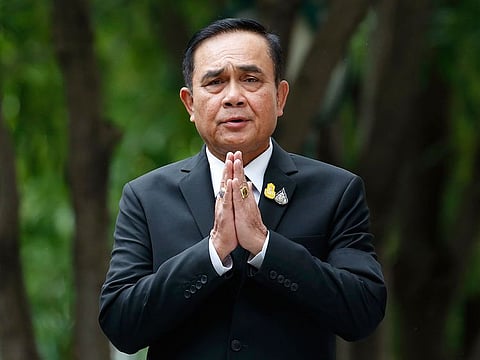Thailand junta leader named prime minister after contentious vote
Prayuth Chan-ocha wins by combined vote of 500-244 in House of Representatives and Senate

BANGKOK: The leader of the junta that seized power in Thailand five years ago, Prayuth Chan-ocha, was chosen by Parliament to be prime minister after an election marred by charges of manipulation.
Prayuth, a former general who held the title of prime minister during the years of military rule, won by a combined vote of 500-244 in the House of Representatives and Senate.
He defeated the opposition nominee, Thanathorn Juangroongruangkit, leader of the pro-democracy Future Forward Party who was elected to Parliament but suspended from his seat last month by the Constitutional Court.
Prayuth, who is not a member of Parliament, chose not to address the joint session. Thanathorn was not allowed to speak before Parliament but delivered a speech outside the chamber.
“I am ready to be the prime minister of truth,” he said. “I am ready to be the prime minister of change. And I am ready the be the prime minister to take Thailand to move forward.”
Future Forward leaders alleged that some lawmakers were offered the equivalent of $1 million (Dh3.67 million) or more to switch sides, though they did not say who made the offers. One member said he had been offered increasingly larger amounts until the figure reached nearly $4 million. A spokesman for the military-backed party, Palang Pracharat, did not respond to a request for comment.
Given that the military appointed all 250 members of the Senate, Parliament’s upper house, Prayuth’s thin edge in the 500-member lower house suggests he is likely to face substantial opposition there from pro-democracy forces in the coming months.
For Prayuth, leading a multiparty, coalition government will be an adjustment.
To get the votes to become prime minister, he had to agree to appoint Cabinet ministers from allied parties. And for the first time, he may now be held to account by an elected lower house with a sizeable opposition bloc.
“This will be different than over the past five years,” said Purawich Watanasukh, a research fellow at the independent King Prajadhipok’s Institute in Bangkok. “In the military regime, he had sole power. This time, we had an election, and he has to share power.”
Thailand, a constitutional monarchy, has a long history of military coups and rewritten constitutions.
The junta seized power in 2014, led by Prayuth, then a general, after months of paralysing street protests in Bangkok by the followers of two rival political factions that are aligned today with the Democrat Party and the Pheu Thai Party.
The junta adopted an interim constitution, which gave the head of the regime absolute power over all branches of government.



